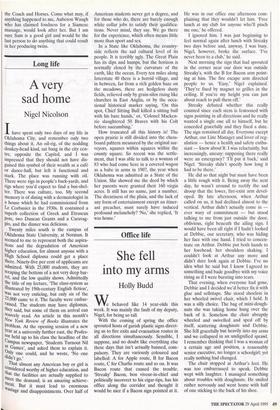Long life
A very sad home
Nigel Nicolson
Ihave spent only two days of my life in Oklahoma City, and remember only two things about it. An oil-rig, of the nodding donkey-head kind, sat bang in the city cen- tre, opposite the Capitol, and I was impressed that they should not have dis- guised this symbol of their wealth as a café or dance-hall, but left it functional and stark. The place was running with oil. There were rigs in people's back-yards, and rigs where you'd expect to find a bus-shel- ter. There was culture, too. My second memory is of dining with a dermatologist in a house which he had commissioned from Le Corbusier in the 1930s. It contained a superb collection of Greek and Etruscan Pots, two Duncan Grants and a Caravag- gio, and the dinner was delicious.
Twenty miles south is the campus of Oklahoma State University, at Norman. It seemed to me to represent both the aspira- tions and the degradation of American higher education, for almost anyone with a High School diploma could get a place there. Ninety-five per cent of applicants are admitted. With 25,000 students, they are scraping the bottom of a not very deep bar- rel, and the low quality shows. Admittedly the title of my lecture, 'The class-system as illustrated by 19th-century English fiction', Was not very enticing, but only six of the 25,000 came to it. The faculty were embar- rassed. The students may have diplomas, they said, but some of them on arrival can scarcely read. An article in this month's New York Review of Books illustrates the Problem. At the opening session of a new Year at a university further east, the Profes- sor held up to his class the headline of the Campus newspaper, 'Students Turnout Nil at Games', and asked them to explain it. Only one could, and he wrote, 'No one didn't go.' That almost any American boy or girl is considered worthy of higher education, and that the facilities are actually supplied to Illect the demand, is an amazing achieve- 'tient. But it must lead to enormous wastage and disappointments. Over half of American students never get a degree, and for those who do, there are barely enough white collar jobs to satisfy their qualifica- tions. Never mind, they say. We go there for the experience, which often means little more than sport and sex.
In a State like Oklahoma, the country- side reflects the sad cultural level of its people. It is terribly ugly. The Great Plain has its dips and humps, but the horizon is normally closed by the curvature of the earth, like the ocean. Every ten miles along Interstate 40 there is a horrid village, and in between, far from a rich golden haze on the meadows, there are hedgeless dusty fields, relieved only by grain-silos rising like churches in East Anglia, or by the occa- sional historical marker saying, 'On this spot, Chief Sitting Bull killed a sitting bull with his bare hands,' or, 'Colonel Macken- zie slaughtered 50 Braves with his Colt before succumbing.'
How truncated all this history is! The open prairie is still divided into the chess- board pattern measured by the original sur- veyors, squares within squares within the county square. So recent was the settle- ment, that I was able to talk to a woman of 83 who had come here in a covered wagon as a babe in arms in 1907, the year when Oklahoma was admitted as a State of the Union. She showed me the deed by which her parents were granted their 160 virgin acres. It still has no name, just a number. The dreariness of the plain, and the lack of any form of entertainment except an itiner- ant preacher, must surely have induced profound melancholy? 'No,' she replied, 'It was home.'


























































 Previous page
Previous page